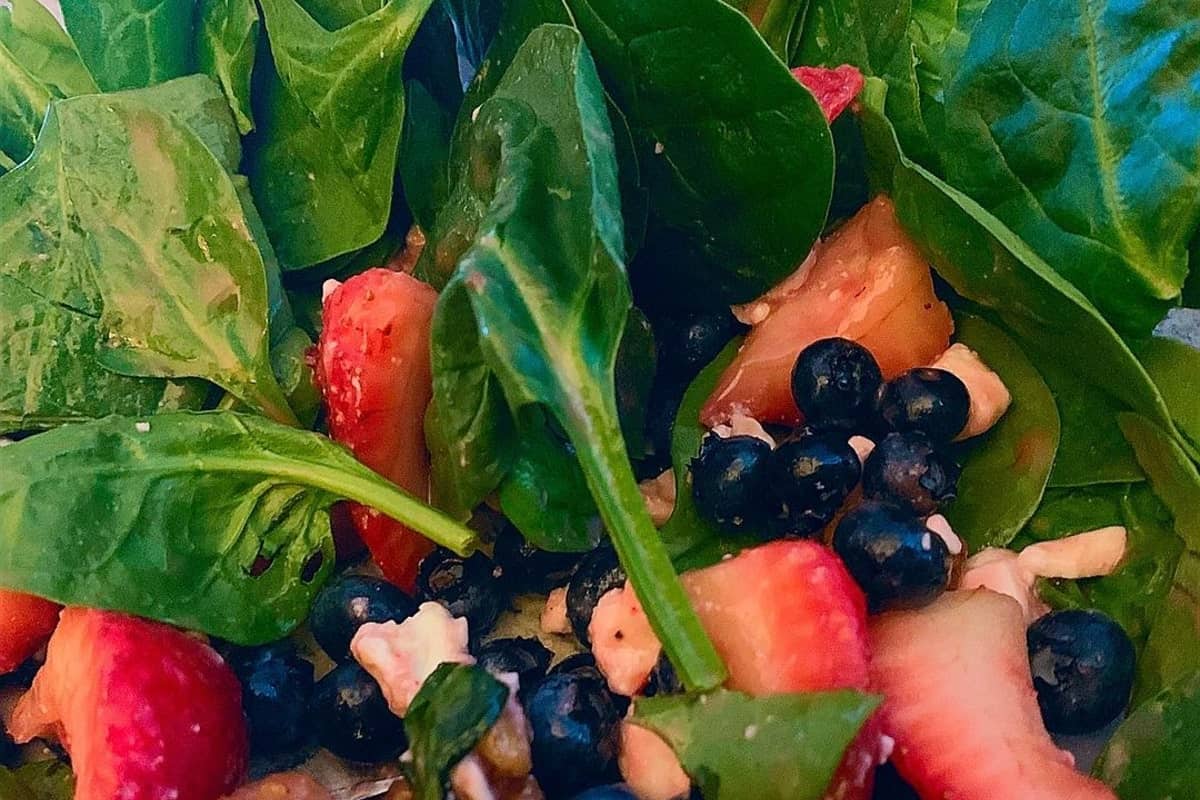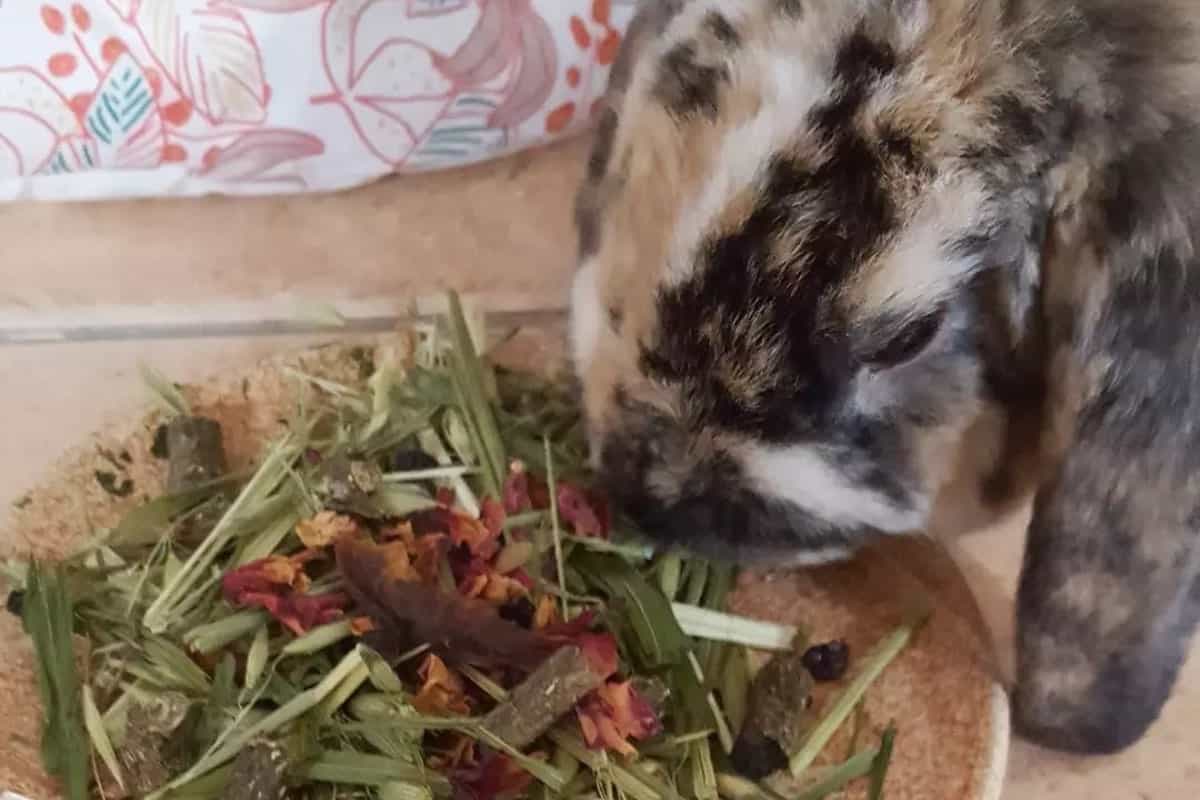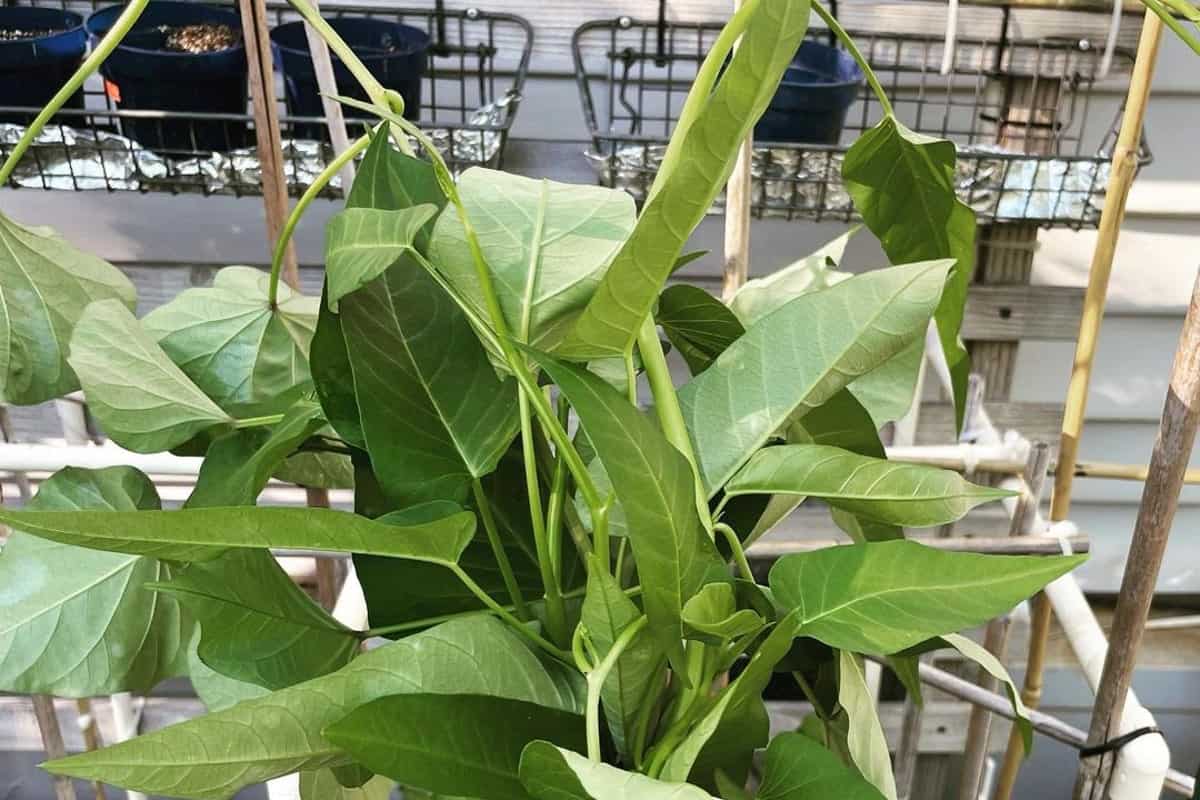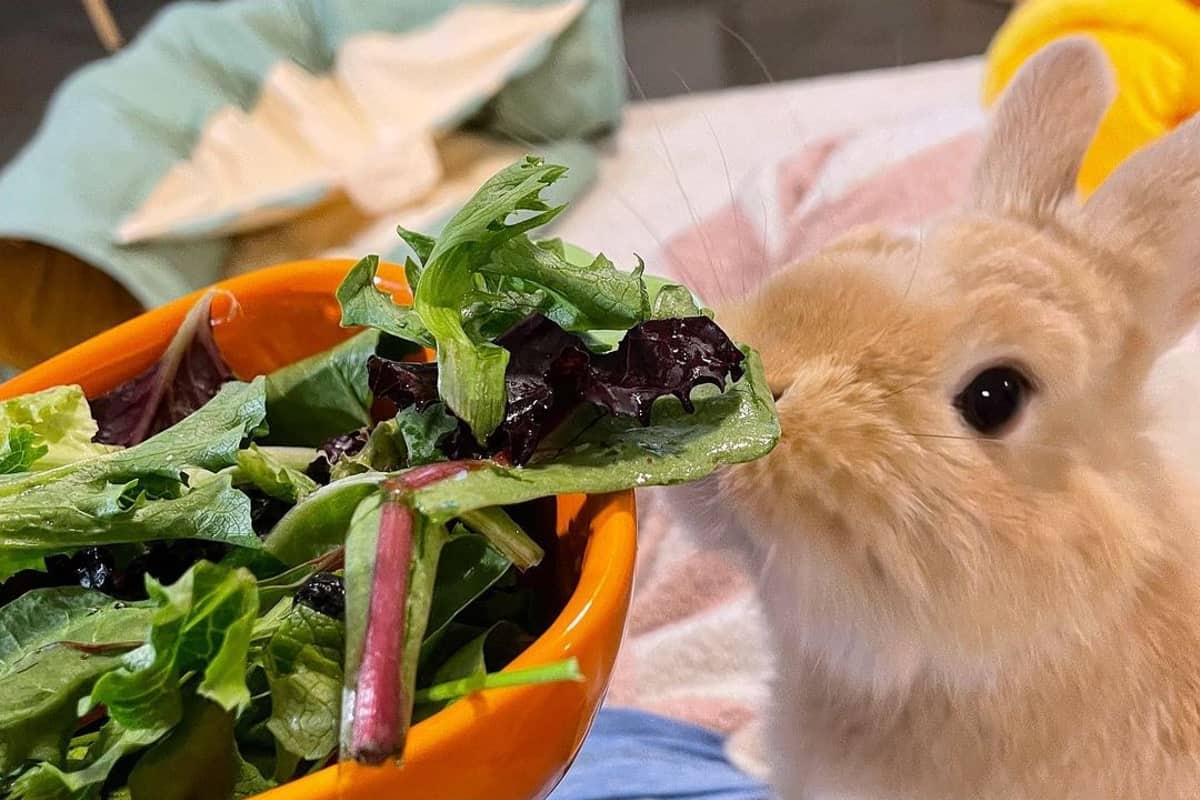Spinach is a leafy green vegetable that is rich in nutrients. It is a good source of dietary fiber, vitamin C, vitamin A, vitamin K, and magnesium. It also contains a small amount of protein and some other essential nutrients. Spinach is a popular vegetable that is eaten by people all over the world. It is also enjoyed by many animals, including rabbits. Although spinach is considered safe for most people to eat, there are a few things to consider before feeding it to rabbits.
Rabbits can eat either raw or cooked spinach. Raw spinach is a good source of fiber and vitamins, but it also contains a high level of water, which can fill up a rabbit’s stomach and cause diarrhea. Cooking spinach destroys some of its vitamins, but it also reduces the amount of water it contains, making it a more digestible food for rabbits.
How Much Spinach Can Rabbits Eat?
Rabbits can eat up to 1/4 cup of spinach per day. Excessive amounts of spinach can cause diarrhea, so it is important to monitor the amount your rabbit eats and adjust the amount as needed. Alternatively, it’s best to feed them spinach only once or twice a week.
Do Rabbits Like Spinach?
Rabbits are often thought of as little creatures that only eat carrots and lettuce. However, rabbits actually enjoy a variety of foods, including spinach.
Spinach is a good source of vitamins and minerals for rabbits, and it can help them stay healthy. However, spinach is also a high-fiber food, so rabbits should only eat a small amount of it at a time.
If you’re wondering whether or not your rabbit likes spinach, the best way to find out is to offer them a small amount and see if they eat it. If they do, then you can be sure that they enjoy the taste of spinach and will be happy to have it as part of their diet.
Nutrition Facts for Spinach
A lot of people think that spinach is a leafy green vegetable that is packed with nutrients. However, not many know the full story behind this nutrient-rich veggie. Here are some interesting nutrition facts about spinach that you may not know:
- Spinach is low in calories and fat, and is a good source of dietary fiber.
- It is rich in vitamins and minerals, including vitamins A, C, K, and folate.
- Spinach also contains phytonutrients that have antioxidant and anti-inflammatory properties.
- Studies have shown that spinach may help protect against cancer, heart disease, and stroke.
- Spinach is a versatile vegetable that can be eaten raw, cooked, or juiced.
So, next time you reach for a spinach salad or spinach smoothie, remember that you are getting a nutrient-rich food that can offer many health benefits.
Benefits of Spinach for Rabbits
Rabbits are herbivores and their diet consists mostly of hay, fresh vegetables, and fresh fruit. While hay is the foundation of a healthy diet for a rabbit, fresh vegetables and fruits are important for a balanced diet and good overall health.
One vegetable that is particularly good for rabbits is spinach. Spinach is packed with nutrients that are essential for rabbits, including vitamins A, C, and K, as well as minerals like iron and calcium.

Here are some of the specific benefits of feeding spinach to your rabbit:
1. Boosts Immunity
The high vitamin C content in spinach helps to boost a rabbit’s immune system. This is important because a strong immune system helps a rabbit to fight off infection and disease.
2. Promotes Healthy Skin and Coat
The vitamins A and E in spinach are important for healthy skin and fur. These vitamins help to keep a rabbit’s coat shiny and lustrous.
3. Improves Digestion
The high fiber content in spinach helps to keep a rabbit’s digestive system healthy. Fiber is important for preventing constipation and other digestive problems in rabbits.
4. Prevents Anemia
The iron in spinach is important for preventing anemia in rabbits. Anemia is a condition in which there is a lack of red blood cells, which can lead to fatigue and other health problems.
5. Builds Strong Bones
The calcium in spinach is important for strong bones. This is especially important for growing rabbits and rabbits who are pregnant or nursing.
If you are looking for a nutritious vegetable to add to your rabbit’s diet, spinach is a great option. This leafy green is packed with essential nutrients that can provide numerous health benefits for your rabbit.
Dangers of Spinach for Rabbits
Spinach is a leafy green vegetable that is popular in many dishes. It is also a common ingredient in rabbit food. However, spinach can be dangerous for rabbits if eaten in inappropriate quantities.
Spinach contains high levels of oxalic acid. This acid can bind with calcium in the rabbit’s body and cause kidney stones. The stones can block the rabbit’s urinary tract and cause severe pain. In some cases, the stones can be life-threatening.

In addition to the risk of kidney stones, spinach is also high in fiber. This can cause digestive problems for rabbits, including gas, bloating, and diarrhea. The high fiber content can also interfere with the absorption of other nutrients, leading to nutritional deficiencies.
If you feed your rabbit spinach, do so in moderation and always offer plenty of fresh water. If your rabbit starts showing signs of digestive upset, consider stopping giving him spinach.
Types of Spinach to Feed Your Rabbit
There are three main types of spinach that you can feed your rabbit: baby spinach, regular spinach, and Swiss chard.
Baby spinach is the most delicate of the three and has a more subtle flavor. It is a good option for rabbits who are new to eating spinach.
Regular spinach is a bit more robust and has a slightly bitter flavor. It is a good option for rabbits who have been eating spinach for a while and are used to the taste.
Swiss chard is the most hearty of the three and has a strong flavor. It is a good option for rabbits who are particularly active and need the extra nutrition.
No matter which type of spinach you choose, make sure it is fresh and free of any pesticides or chemicals. Wash it thoroughly before feeding it to your rabbit.
Foods You Should Not Combine with Spinach
There are some foods that you should not combine with spinach when feeding your rabbit. These foods can cause gastrointestinal problems for your rabbit, including diarrhea. The foods that you should not combine with spinach include:
- Grapes
- Pears
- Apricots
- Peaches
- Plums
If you are ever unsure about whether or not a food is safe to give to your rabbit, consult with your veterinarian.
Foods That You Can Combine with Spinach

There are many different types of food that you can combine with spinach when feeding your rabbit. Some good options include hay, carrots, and apples. Hay is a good source of fiber, which can help keep your rabbit’s digestive system healthy. Carrots are a good source of vitamin A, which is important for keeping your rabbit’s eyes healthy. Apples are a good source of vitamin C, which can help keep your rabbit’s immune system strong.
Can Rabbits Eat Tree Spinach?
Tree spinach is a leafy green vegetable that is related to both spinach and beets. It is an annual plant that is typically grown as an ornamental, but can also be eaten. The leaves are edible and have a mild flavor. They can be eaten raw or cooked. Tree spinach is high in vitamins A and C, as well as potassium.
Rabbits can eat tree spinach, but it should only be given in small amounts. The leaves are high in potassium, so too much can be harmful to rabbits.
Can Rabbits Eat Water Spinach?
Water spinach is a popular vegetable in Southeast Asia and parts of Africa. The plant is a member of the spinach family and is grown in water or in moist soil. The leaves and stem of the plant are edible. The taste of the plant is a bit sour and has a crunchy texture.
Water spinach is a good source of vitamins A and C, as well as iron. The plant is also a good source of dietary fiber.
Many people are surprised to learn that rabbits can eat water spinach. In fact, water spinach is a good food for rabbits. The plant is high in fiber and vitamins A and C. The plant also has a high moisture content, which is good for rabbits.
Water spinach can be fed to rabbits fresh or dried. If feeding the plant fresh, it should be chopped into small pieces so that the rabbit can chew it easily. If feeding the plant dried, it should be rehydrated before feeding to the rabbit.

FAQ
Can rabbits eat spinach leaves?
As for “can bunnies eat spinach leaves?”, yes, rabbits can eat spinach leaves.
Can rabbits eat baby spinach?
As for “can bunnies eat baby spinach?”, yes, rabbits can eat baby spinach.
Can wild rabbits eat spinach?
Yes, wild rabbits can eat spinach.
How much spinach can rabbits eat?
Rabbits can eat about one cup of spinach leaves per day.
How often can rabbits eat spinach?
Rabbits can eat spinach every day.
Can baby bunnies eat spinach?
No, it’s best for them to grow up before they try spinach.
Conclusion
Can bunnies eat spinach? Yes, rabbits can eat spinach. Spinach is a healthy, leafy vegetable that is packed with nutrients. It is a good source of vitamin A, vitamin C, vitamin K, magnesium, and potassium. Spinach can help to improve rabbit health and vitality.
Although, you should feed spinach to your rabbits only in small quantities. Of what can rabbits eat spinach is one of the most beneficial foods for their health.
Also read:
- Discover the Amazing World of 10 Day Old Bunnies: All About Rabbits!
- Discover All About the Characteristics of a 1 Year Old Rabbit
- Why Doesn’t My Rabbit Like Me? – Understanding Rabbit Behavior for All About Rabbits
- Everything You Need to Know About Bunny Grinding Teeth in Rabbits
- How Eating Poop is Part of a Normal Rabbit Diet – All About Rabbits
References
- Fresh (Spinach) | wikiHow – https://www.wikihow.com/Keep-Spinach-Fresh
- Water spinach | WorldCrops – https://worldcrops.org/crops/water-spinach
